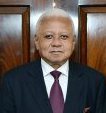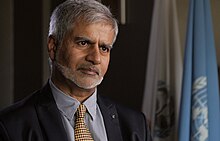
Genocide is the intentional destruction of a people in whole or in part.

Crimes against humanity are certain serious crimes committed as part of a large-scale attack against civilians. Unlike war crimes, crimes against humanity can be committed during both peace and war and against a state's own nationals as well as foreign nationals. Together with war crimes, genocide, and the crime of aggression, crimes against humanity are one of the core crimes of international criminal law, and like other crimes against international law have no temporal or jurisdictional limitations on prosecution.

The International Criminal Tribunal for Rwanda was an international court established in November 1994 by the United Nations Security Council in Resolution 955 in order to adjudicate people charged for the Rwandan genocide and other serious violations of international law in Rwanda, or by Rwandan citizens in nearby states, between 1 January and 31 December 1994. The court eventually convicted 61 individuals and acquitted 14.

Mahmoud Cherif Bassiouni was an Egyptian-American emeritus professor of law at DePaul University, where he taught from 1964 to 2012. He served in numerous United Nations positions and served as the consultant to the US Department of State and Justice on many projects. He was a founding member of the International Human Rights Law Institute at DePaul University which was established in 1990. He served as president from 1990 to 1997 and then as president emeritus. Bassiouni is often referred to by the media as "the Godfather of International Criminal Law" and a "war crimes expert". As such, he served on the Steering Committee for The Crimes Against Humanity Initiative, which was launched to study the need for a comprehensive convention on the prevention and punishment of crimes against humanity, and draft a proposed treaty. He spearheaded the drafting of the proposed convention, which as of 2014 is being debated at the International Law Commission.

Theodor Meron, is an American-Israeli lawyer and judge. He served as a judge of the International Criminal Tribunal for the former Yugoslavia (ICTY), International Criminal Tribunal for Rwanda (ICTR), and the International Residual Mechanism for Criminal Tribunals (Mechanism). He served as President of the ICTY four times and inaugural President of the Mechanism for three terms (2012–19).

Fausto Pocar is an Italian jurist.

International criminal law (ICL) is a body of public international law designed to prohibit certain categories of conduct commonly viewed as serious atrocities and to make perpetrators of such conduct criminally accountable for their perpetration. The core crimes under international law are genocide, war crimes, crimes against humanity, and the crime of aggression.

In the practice of international law, command responsibility is the legal doctrine of hierarchical accountability for war crimes, whereby a commanding officer (military) and a superior officer (civil) is legally responsible for the war crimes and the crimes against humanity committed by his subordinates; thus, a commanding officer always is accountable for the acts of commission and the acts of omission of his soldiers.

Navanethem "Navi" Pillay is a South African jurist who served as the United Nations High Commissioner for Human Rights from 2008 to 2014. A South African of Indian Tamil origin, Pillay was the first non-white woman judge of the High Court of South Africa. She has also served as a judge of the International Criminal Court and President of the International Criminal Tribunal for Rwanda. Her four-year term as High Commissioner for Human Rights began on 1 September 2008 and was extended an additional two years in 2012. In September 2014 Prince Zeid bin Ra'ad succeeded her in her position as High Commissioner for Human Rights. In April 2015, Pillay became the 16th Commissioner of the International Commission Against the Death Penalty. She is also one of the 25 leading figures on the Information and Democracy Commission launched by Reporters Without Borders.

Hassan Bubacar Jallow is a Gambian judge who has served as Chief Justice of the Gambia since February 2017. He was the Prosecutor of the International Criminal Tribunal for Rwanda (ICTR) from 2003 to 2016, and Prosecutor of the International Residual Mechanism for Criminal Tribunals (IRMCT) from 2012 to 2016, both at the rank of United Nations Under Secretary-General. He served as Minister of Justice and Attorney General from 1984 to 1994 under President Dawda Jawara.

William Anthony Schabas, OC is a Canadian academic specialising in international criminal and human rights law. He is professor of international law at Middlesex University in the United Kingdom, professor of international human law and human rights at Leiden University in the Netherlands, and an internationally respected expert on human rights law, genocide and the death penalty.

Charles Ayodeji Adeogun-Phillips is a former United Nations genocide and war crimes prosecutor, international lawyer and founder of Charles Anthony (Lawyers) LLP.
An atrocity crime is a violation of international criminal law that falls under the historically three legally defined international crimes of genocide, war crimes, and crimes against humanity. Ethnic cleansing is widely regarded as a fourth mass atrocity crime by legal scholars and international non-governmental organizations (NGOs) working in the field, despite not yet being recognized as an independent crime under international law.

United Nations Security Council resolution 935, adopted unanimously on 1 July 1994, after recalling all resolutions on Rwanda, particularly 918 (1994) and 925 (1994), the Council requested the Secretary-General Boutros Boutros-Ghali to establish a Commission of Experts to investigate violations of international humanitarian law during the Rwandan genocide.

United Nations Security Council resolution 955, adopted on 8 November 1994, after recalling all resolutions on Rwanda, the Council noted that serious violations of international humanitarian law had taken place in the country and, acting under Chapter VII of the United Nations Charter, established the International Criminal Tribunal for Rwanda (ICTR).

Mohamed Chande Othman is a Tanzanian lawyer and a former Chief Justice of Tanzania.
The term international framework of sexual violence refers to the collection of international legal instruments – such as treaties, conventions, protocols, case law, declarations, resolutions and recommendations – developed in the 20th and 21st century to address the problem of sexual violence. The framework seeks to establish and recognise the right all human beings to not experience sexual violence, to prevent sexual violence from being committed wherever possible, to punish perpetrators of sexual violence, and to provide care for victims of sexual violence. The standards set by this framework are intended to be adopted and implemented by governments around the world in order to protect their citizens against sexual violence.
The Crimes Against Humanity Initiative is a rule of law research and advocacy project of the Whitney R. Harris World Law Institute. Started in 2008 by Professor Leila Nadya Sadat, the Initiative has as its goals the study of the need for a comprehensive international convention on the prevention and punishment of crimes against humanity, the analysis of the necessary elements of such a convention, and the drafting of a proposed treaty. To date, the Initiative has held several experts' meetings and conferences, published a Proposed Convention on the Prevention and Punishment of Crimes Against Humanity, and resulted in the publication of an edited volume, Forging a Convention for Crimes Against Humanity, by Cambridge University Press. The draft treaty is now available in seven languages. The UN International Law Commission produced its own, similar, set of Draft Articles on the Prevention and Punishment of Crimes against Humanity, and a proposed treaty is now being debated by governments around the world.
Genocidal intent is the mens rea for the crime of genocide. "Intent to destroy" is one of the elements of the crime of genocide according to the 1948 Genocide Convention. There is an unresolved "intend debate" over whether dolus directus needs to be proven to convict for genocide, or whether a knowledge-based standard should be enough to convict for genocide.















